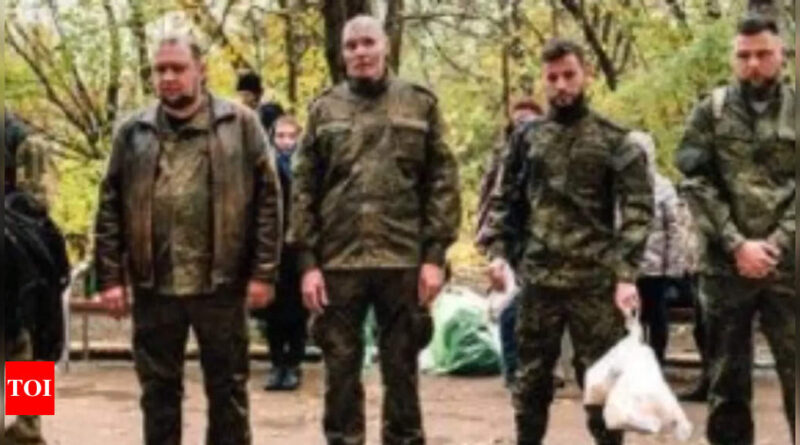They refused to fight for Russia. The law did not treat them kindly – Times of India
Since Moscow’s invasion of Ukraine, hundreds of Russian men have faced criminal charges for becoming war refuseniks. That has not stopped others from going to unusual lengths to avoid battle.
An officer in the Federal Guard Service, which is responsible for protecting President Putin, decided last fall to avoid fighting in Ukraine by sneaking across the southern border into Kazakhstan. The officer, Maj. Mikhail Zhilin, disguised himself as a mushroom picker, wearing camouflage and carrying a couple of small bottles of cognac so that he could douse himself and act drunk and disoriented if he encountered the Russian border patrol. In the dark, the lean, fit major navigated across the forested frontier without incident, but he was arrested on the other side. Kazakhstan rejected his bid for political asylum and handed him back to Russia to face trial for desertion.
Major Zhilin is among the hundreds of Russian men who faced criminal charges for becoming war refuseniks since Moscow’s full-scale invasion of Ukraine last year. Last year, 1,121 people were convicted of evading mandatory military conscription, according to statistics from Russia’s Supreme Court, compared with an average of around 600 in more recent years. Before the war, a vast majority were fined, not imprisoned. Russia recently passed a measure making it much harder to avoid a draft summons. The maximum sentence was doubled to 10 years for what is euphemistically called “Leaving for Sochi. ”That has not stopped Russian men from going to unusual lengths to avoid fighting. One officer said he took a bullet in the leg as part of a pact among several soldiers to shoot one another and then claim that they were wounded in a firefight and then try to flee.
The Kremlin has shrouded in secrecy an increasing amount of information about the military, including new statistics about crimes involving military service, so the numbers are undoubtedly higher than what is available.
In theory, Russian law allows for conscientious objectors performing alternative service, but it is rarely granted. Sometimes those charged with refusing to fight are given suspended sentences, which means they can be redeployed. The officer who was shot in the leg by his colleague had pursued a military career since he was 9 and a cadet, he said, but he wanted it to be over the minute he was ordered into Ukraine.
He ended up staying about three months, appalled by the very idea of the war as well as by the terrible state of the Russian military. Soldiers were not provided basic items like underwear, he said. After he recovered, and the military ordered him back to Ukraine, he decided to run.
An officer in the Federal Guard Service, which is responsible for protecting President Putin, decided last fall to avoid fighting in Ukraine by sneaking across the southern border into Kazakhstan. The officer, Maj. Mikhail Zhilin, disguised himself as a mushroom picker, wearing camouflage and carrying a couple of small bottles of cognac so that he could douse himself and act drunk and disoriented if he encountered the Russian border patrol. In the dark, the lean, fit major navigated across the forested frontier without incident, but he was arrested on the other side. Kazakhstan rejected his bid for political asylum and handed him back to Russia to face trial for desertion.
Major Zhilin is among the hundreds of Russian men who faced criminal charges for becoming war refuseniks since Moscow’s full-scale invasion of Ukraine last year. Last year, 1,121 people were convicted of evading mandatory military conscription, according to statistics from Russia’s Supreme Court, compared with an average of around 600 in more recent years. Before the war, a vast majority were fined, not imprisoned. Russia recently passed a measure making it much harder to avoid a draft summons. The maximum sentence was doubled to 10 years for what is euphemistically called “Leaving for Sochi. ”That has not stopped Russian men from going to unusual lengths to avoid fighting. One officer said he took a bullet in the leg as part of a pact among several soldiers to shoot one another and then claim that they were wounded in a firefight and then try to flee.
The Kremlin has shrouded in secrecy an increasing amount of information about the military, including new statistics about crimes involving military service, so the numbers are undoubtedly higher than what is available.
In theory, Russian law allows for conscientious objectors performing alternative service, but it is rarely granted. Sometimes those charged with refusing to fight are given suspended sentences, which means they can be redeployed. The officer who was shot in the leg by his colleague had pursued a military career since he was 9 and a cadet, he said, but he wanted it to be over the minute he was ordered into Ukraine.
He ended up staying about three months, appalled by the very idea of the war as well as by the terrible state of the Russian military. Soldiers were not provided basic items like underwear, he said. After he recovered, and the military ordered him back to Ukraine, he decided to run.




